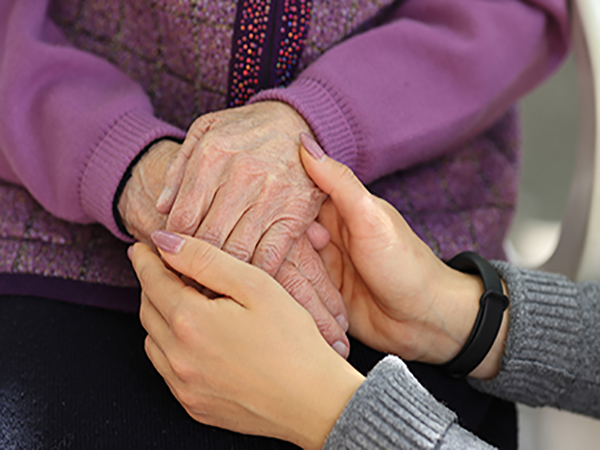Advanced Kidney Cancer: Progress and Challenges
For Bruce Hill, who was diagnosed with stage 4 clear cell renal cell carcinoma (RCC) in 2017, scientific progress came just at the right time. After two surgeries to remove his kidney and then spots on his lung, Hill started treatment in August 2018, taking Opdivo (nivolumab) and Yervoy (ipilimumab), an immunotherapy treatment combination that was approved by the U.S. Food and Drug Administration as a first-line treatment for patients with certain kinds of RCC just months before.
Cancer Today, a magazine and online resource for cancer patients, survivors, and caregivers, told Hill’s story in a recent feature that describes the recent progress as well as the challenges in treating patients who have advanced-stage kidney cancer.
“If you go back more than 20 years, we didn’t have much to offer patients with advanced kidney cancer because they are traditionally resistant to chemotherapy and older forms of radiation therapy,” David McDermott, MD, a medical oncologist at Beth Israel Deaconess Medical Center in Boston, says. “The standard things that work for other tumors don’t work for kidney cancers well at all.”

As March, which is National Kidney Cancer Awareness month, comes to a close, the article describes the growing number of treatment options for advanced kidney cancer, including immunotherapies, which work by unleashing the immune system to fight cancer, and angiogenesis inhibitors, which block the growth of blood vessels that feed cancer, often by targeting a protein known as vascular endothelial growth factor (VEGF).
“Today we have so many treatments we didn’t have in the past and that has impacted survival in a significant way,” says Toni Choueiri, MD, a medical oncologist at Dana-Farber Cancer Institute in Boston. The median survival for a person with advanced kidney cancer 15 years ago was just over a year, Choueiri says. Now, people with advanced kidney cancers live a median of four years. Despite seeing improvements in overall survival with combination treatments, there’s plenty of work to do, Choueiri says. “It’s been a humbling journey. We haven’t cured many patients.”
As treatment options have grown in number, so too have questions about which approaches are best for which patients and how to choose among them, the article notes. Doctors rely on clinical features including blood cell counts and other factors to determine which patients with kidney cancer are at higher risk for poor outcomes. But, Choueiri says, “unlike lung cancer and others, we don’t have biomarkers” in the tumor or blood that indicate whether the cancer will respond to certain treatments. As a result, “choosing among [treatment] options is more art than science,” says McDermott. “It often comes down to the pros and cons of each approach and physician comfort in managing those treatments.”
Combination treatments, while they can lead to good outcomes, also more often come with complications due to side effects associated with two drugs instead of one. McDermott often uses the combination of Opdivo and Yervoy for his patients. He bases this on research from the Checkmate-214 trial. The most recent data, presented at the European Society for Medical Oncology Virtual Congress in September 2020, show that 50 percent of patients with intermediate-risk or poor-risk advanced RCC taking the immunotherapy combo were alive at four years compared to 35.8 percent of patients taking Sutent. “That’s pretty good,” McDermott says. “It’s not great, but it’s a high bar for other approaches to beat. To me, what’s going to matter is where these patients are in five years. How many are alive with treatment? How many no longer need treatment?”
Long-term data on the combinations of immunotherapy and targeted therapies aren’t in yet. Even when they are, questions will remain. That’s because newer immunotherapies and targeted treatment combinations have been approved based on comparisons against the old standard of Sutent, rather than comparisons to each other. In addition, ideally, drugs used in combination would be compared to the same drugs in sequence, says James Brugarolas, MD, PhD, a renal oncology specialist and director of the Kidney Cancer Program at the University of Texas Southwestern Medical Center in Dallas. He also says it’s not clear whether it is better to administer a combination immunotherapy or a combination of immunotherapy and targeted therapy together. “There is lack of understanding of the magnitude of the synergy and whether these combinations are necessary for all patients,” says Brugarolas.
For Hill, the combination of the immunotherapy drugs Opdivo and Yervoy has been effective. Hill had surgery to remove his kidney in June 2017 and another surgery to remove three large spots from his lungs in October 2017. Then he went to see an oncologist at Memorial Sloan Kettering Cancer Center in New York City, who recommended a period of watchful waiting for smaller spots that remained in his lungs. Hill started on the immunotherapy combination after the spots showed signs of progression in August 2018. Two months later, the spots were shrinking. By December 2018, only one tiny spot remained visible, and it’s been stable since. He is no longer undergoing treatment and recently graduated to having scans every six months instead of every three.
Scientists and physicians are also working on other approaches to help patients—not all of which rely on new drugs or drug combinations. For example, some patients with metastatic kidney cancer may have a small number of metastases that develop two to three years after surgery. In such cases, Brugarolas and his colleagues are pioneering an approach to treating kidney cancer known as stereotactic ablative body radiation therapy, in which focused radiation is applied directly to the sites of a cancer’s spread. The treatment can be enough to control certain slower-growing metastases. It’s also possible that such treatment in combination with immunotherapy could help to further activate the immune system against the cancer.
Brugarolas is also excited about the potential of novel imaging approaches to help visualize PD-L1 that could identify which kidney cancers will respond to immunotherapy treatment. Other potentially promising drugs, including a glutaminase inhibitor and a modified form of a drug called interleukin-2, are being tested in clinical trials to be used in combination with Opdivo, Choueiri says.
A phase III trial is now testing a new drug called MK-6482, which has shown promise as a first-in-class single agent to block blood-vessel growth by targeting another protein in the angiogenesis pathway. There is also hope for discovering new biomarkers to help decide among treatment options for individual patients. For instance, a study published in the July 2020 Journal for ImmunoTherapy of Cancer showed that mutations in a gene called TERT might help identify patients who won’t likely benefit from immune checkpoint inhibitors, such as Keytruda or Opdivo.
“I think there is going to be a push toward precision medicine in kidney cancer,” says Ali Zhumkhawala, MD, a urologic oncology surgeon at City of Hope National Medical Center in Duarte, California, who notes that knowledge of tissue biology coupled with advances in imaging could expand understanding of RCC and its treatment. “I think a lot of neat things are coming around that will help tailor treatment to individual patients.”
Hill remains encouraged. Now a member of the Patient and Caregiver Advisory Council for the Kidney Cancer Association, Hill advises patients to explore all their options. “Don’t take this diagnosis and think it’s the end of your life, because it’s not necessarily,” he says. “There have been a lot of advancements in treatment and how to manage [advanced] kidney cancer. Even if you don’t have a complete response, treatment may keep the cancer in check to stop the progression. You can live a healthy life.”
This article was excerpted from Cancer Today, a magazine and online resource for cancer patients, survivors, and caregivers that is published by the American Association for Cancer Research. Subscriptions to the magazine, which is published four times a year, are free to cancer patients, survivors and caregivers who live in the U.S.



